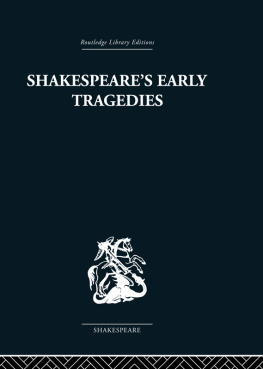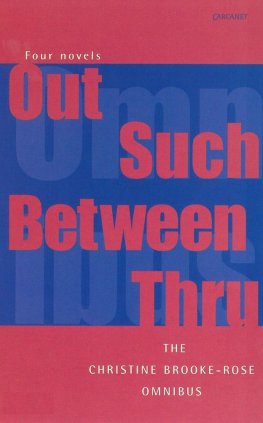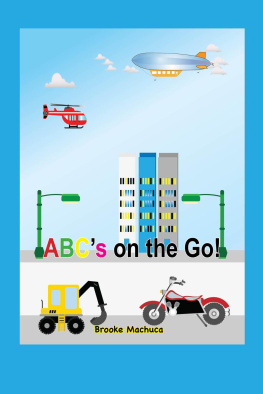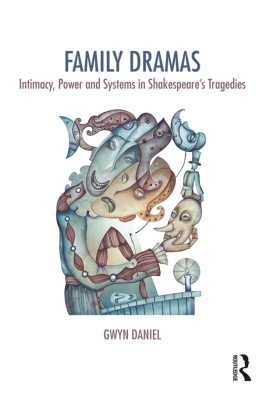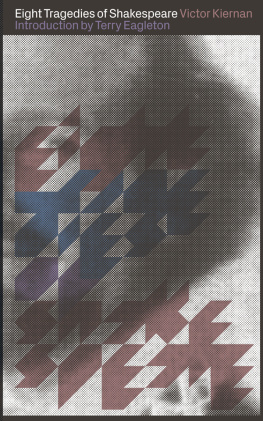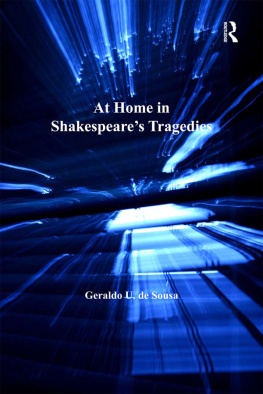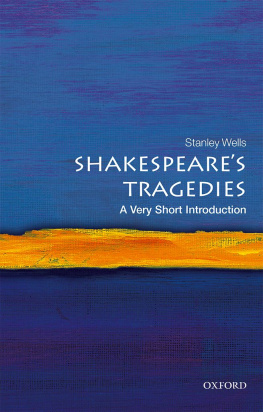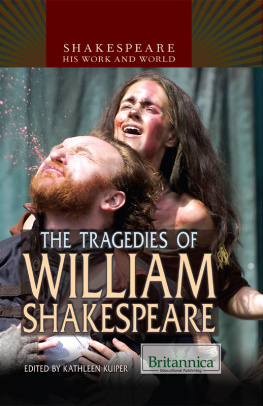Brooke Nicholas - Shakespeares early tragedies
Here you can read online Brooke Nicholas - Shakespeares early tragedies full text of the book (entire story) in english for free. Download pdf and epub, get meaning, cover and reviews about this ebook. City: London, year: 2005, publisher: Routledge, genre: Romance novel. Description of the work, (preface) as well as reviews are available. Best literature library LitArk.com created for fans of good reading and offers a wide selection of genres:
Romance novel
Science fiction
Adventure
Detective
Science
History
Home and family
Prose
Art
Politics
Computer
Non-fiction
Religion
Business
Children
Humor
Choose a favorite category and find really read worthwhile books. Enjoy immersion in the world of imagination, feel the emotions of the characters or learn something new for yourself, make an fascinating discovery.
- Book:Shakespeares early tragedies
- Author:
- Publisher:Routledge
- Genre:
- Year:2005
- City:London
- Rating:5 / 5
- Favourites:Add to favourites
- Your mark:
- 100
- 1
- 2
- 3
- 4
- 5
Shakespeares early tragedies: summary, description and annotation
We offer to read an annotation, description, summary or preface (depends on what the author of the book "Shakespeares early tragedies" wrote himself). If you haven't found the necessary information about the book — write in the comments, we will try to find it.
Shakespeares early tragedies — read online for free the complete book (whole text) full work
Below is the text of the book, divided by pages. System saving the place of the last page read, allows you to conveniently read the book "Shakespeares early tragedies" online for free, without having to search again every time where you left off. Put a bookmark, and you can go to the page where you finished reading at any time.
Font size:
Interval:
Bookmark:
Routledge Library Editions
SHAKESPEARES
EARLY TRAGEDIES

SHAKESPEARE
Routledge Library Editions Shakespeare
TRAGEDIES
In 8 Volumes
I | Shakespeares Early Tragedies | Brooke |
II | Shakespeares Tragedies | Harrison |
III | Shakespeare and the Reason | Hawkes |
IV | The Story of the Night | Holloway |
V | Shakespeares God | Morris |
VI | Shakespeares Tragic Sequence | Muir |
VII | Patterns in Shakespearian Tragedy | Ribner |
VIII | Music in Shakespearean Tragedy | Sternfeld |
SHAKESPEARES
EARLY TRAGEDIES
NICHOLAS BROOKE

First published in 1968
Reprinted in 2005 by
Routledge
2 Park Square, Milton Park, Abingdon, Oxon, OX14 4RN
Transferred to Digital Printing 2008
Routledge is an imprint of the Taylor & Francis Group
1968 Nicholas Brooke
All rights reserved. No part of this book may be reprinted or reproduced or utilized in any form or by any electronic, mechanical, or other means, now known or hereafter invented, including photocopying and recording, or in any information storage or retrieval system, without permission in writing from the publishers.
The publishers have made every effort to contact authors/copyright holders of the works reprinted in Routledge Library Editions Shakespeare. This has not been possible in every case, however, and we would welcome correspondence from those individuals/companies we have been unable to trace.
These reprints are taken from original copies of each book. In many cases the condition of these originals is not perfect. The publisher has gone to great lengths to ensure the quality of these reprints, but wishes to point out that certain characteristics of the original copies will, of necessity, be apparent in reprints thereof.
British Library Cataloguing in Publication Data
A CIP catalogue record for this book
is available from the British Library
Shakespeares Early Tragedies
ISBN 0-415-35320-3
ISBN 0-415-33086-6 (set)
Miniset: Tragedies
Series: Routledge Library Editions Shakespeare
Shakespeares
Early Tragedies
Nicholas Brooke
METHUEN & CO LTD
First published 1968
by Methuen and Co Ltd
11 New Fetter Lane, London EC4
1968 Nicholas Brooke
Printed in Great Britain by
Richard Clay (The Chaucer Press) Ltd.,
Bungay, Suffolk
SBN 416 19340 4
Distributed in the U.S.A. by
Barnes & Noble Inc.
for
Clifford and Gabriele Leech
Some parts of the first three essays have appeared in print before, and I am grateful to the editors and publishers of Critical Quarterly, and of Gemini Books 2: Shakespeare: The Tragedies, ed. C. Leech, for permission to reprint them here.
Quotations and line references are, for the plays discussed, to the new Arden Shakespeare where available, that is for Titus Andronicus, ed. J. C. Maxwell, Richard II, ed. P. Ure, and Julius Caesar, ed. T. S. Dorsch: I am indebted to their editors for their commentaries and introductions as well as for their texts. For Richard III, Romeo and Juliet, and Hamlet I have used the Collins Tudor Shakespeare, ed. P. Alexander, and found particular help for all the plays in the New Cambridge Shakespeare, ed. J. Dover Wilson. References to other Shakespeare plays are always to Alexanders edition.
I owe a great debt, too, to innumerable other critics and scholars who have written on Shakespeare: it would be impossible to record this in detail, and I have used footnotes only sparingly for specific points; the books and essays which I have found most interesting are listed in the selective bibliography, though it should be said that some of the more recent items were published after I had drafted my own discussion of the plays.
Most of these essays originated as lectures in the University of Durham, given at the suggestion of Professor Clifford Leech: it is a pleasure to recall the encouragement, and the criticism, that made working with him there such a memorable experience. I am grateful too to students in Durham and in the University of East Anglia with whom I have discussed these plays.
Finally, I must acknowledge the patience of my family during the years in which, on and off, I have been pre-occupied with this book, and especially my wife and our younger son, Thomas, who have lately laboured prodigiously to compile the index.
July, 1968
It has for some time seemed an established fact that Shakespeares greatest plays were his tragedies, and that the period of his greatest tragedies began with Hamlet and ended with Macbeth. This has been so generally agreed in the past hundred years that it has come to seem an irrefutable judgement; perhaps it is in fact so, I certainly do not intend to challenge it in this book. But it did not always seem so transparently clear, or at least did not once seem to rest on so absolute a distinction; it was not in fact given final identity before Bradleys Shakespearean Tragedy appeared in 1904. German criticism and German philosophy of the nineteenth century, the work especially of Hegel and Nietzsche, assured the preeminence of tragedy, and especially of Greek tragedy; it was Bradleys achievement to transfer this allegiance decisively to Shakespeare. In his modification of Hegels theories to fit the English case, he established strong grounds for believing that tragedy is not just a dramatic genre, but, in its true form, a distinctive and peculiarly fine experience.
It is, I think, rather curious how easily this discrimination has been assimilated: it seems to have become possible for every schoolchild to distinguish true tragedy from any other play which ends with the death of the hero. Some may have doubts whether Antony and Cleopatra ought not to be admitted to the distinguished group, though Bradley determined with particular care that it should not. But no one, so far as I know, has proposed that any tragedy before Hamlet should be regarded in the same light. The earlier plays are often treated as merely that: exercises prior to the great achievement that was to follow. Yet I said that this, which has become so clear, was not always so: Whately compared Richard III and Macbeth in the eighteenth century, and saw the superiority of the later play; but he did it, a hundred and fifty years after Shakespeares death, with an air of discovery; and he certainly did not determine that because Macbeth was a superior play, Richard III was therefore an uninteresting one. And in comedy, no such distinction has yet been established: no doubt there are marks of maturity in As You Like It that are lacking in Loves Labours Lost; it would not be difficult to point them out; but they are not such as to ensure general agreement that the later play is in an altogether different class. But then, no one has had an intuition of a definable comic experience by which one may know true comedy from any other kind.
The theatre itself does not seem to have been more discriminating in tragedy than in comedy. Hamlet is altogether Shakespeares most successful play; but after that it is not clear that the later plays come off better than the earlier, and it is in fact quite clear that
Next pageFont size:
Interval:
Bookmark:
Similar books «Shakespeares early tragedies»
Look at similar books to Shakespeares early tragedies. We have selected literature similar in name and meaning in the hope of providing readers with more options to find new, interesting, not yet read works.
Discussion, reviews of the book Shakespeares early tragedies and just readers' own opinions. Leave your comments, write what you think about the work, its meaning or the main characters. Specify what exactly you liked and what you didn't like, and why you think so.

